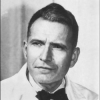Erwin Chargaff

Erwin Chargaff
Erwin Chargaffwas an Austro-Hungarian biochemist who immigrated to the United States during the Nazi era and was a professor of biochemistry at Columbia University medical school. Through careful experimentation, Chargaff discovered two rules that helped lead to the discovery of the double helix structure of DNA...
NationalityAustrian
ProfessionScientist
Date of Birth11 August 1905
CountryAustria
fields common scientist
Outside his own ever-narrowing field of specialization, a scientist is a layman. What members of an academy of science have in common is a certain form of semiparasitic living.
truth men half
He [said of one or other eminent colleagues] is a very busy man, and half of what he publishes is true, but I don't know which half.
fashion men long
Scientific fashions last longer than women's fashions but not as long as men's
real men wind
There are no such men today. We have created a mechanism that makes it practically impossible for a real genius to appear. In my own field the biochemist Fritz Lipmann or the much maligned Linus Pauling were very talented people. But generally, geniuses everywhere seem to have died out by 1914. Today, most are mediocrities blown up by the winds of the time.
science men way
If at one time or another I have brushed a few colleagues the wrong way, I must apologize: I had not realized that they were covered with fur.
death science axes
There is no question in my mind that we live in one of the truly bestial centuries in human history. There are plenty of signposts for the future historian, and what do they say? They say 'Auschwitz' and 'Dresden' and 'Hiroshima' and 'Vietnam' and 'Napalm.' For many years we all woke up to the daily body count on the radio. And if there were a way to kill people with the B Minor Mass, the Pentagon-Madison Avenue axis would have found it.
thinking tanks process
When the so-called think tanks began to replace the thought processes of human beings, I called them the aseptic tanks.
growing-up men mars
The modern version of Buridan's ass [a figurative description of a man of indecision] has a Ph.D., but no time to grow up as he is undecided between making a Leonardo da Vinci in the test tube or planting a Coca Cola sign on Mars.
dark brain elements
We manipulate nature as if we were stuffing an Alsatian goose. We create new forms of energy; we make new elements; we kill crops; we wash brains. I can hear them in the dark sharpening their lasers.
moon atoms use
You can stop splitting the atom; you can stop visiting the moon; you can stop using aerosols; you may even decide not to kill entire populations by the use of a few bombs. But you cannot recall a new form of life.
writing men literary-genre
A scientific autobiography belongs to a most awkward literary genre. If the difficulties facing a man trying to record his life are great - and few have overcome them successfully - they are compounded in the case of scientists, of whom many lead monotonous and uneventful lives and who, besides, often do not know how to write . . .
life-is inexplicable continuing
Life is the continuing intervention of the inexplicable.
men animal cells
If you can modify a cell, it's only a short step to modifying a mouse, and if you can modify a mouse, it's only a step to modifying a higher animal, even man.
character successful science
The narrow slit through which the scientist, if he wants to be successful, must view nature constructs, if this goes on for a long time, his entire character; and, more often than not, he ends up becoming what the German language so appropriately calls a Fachidiot (professional idiot).